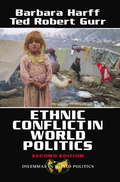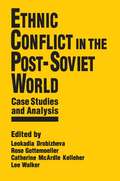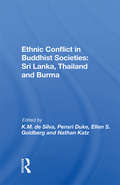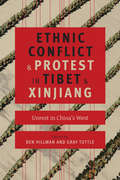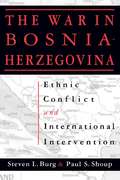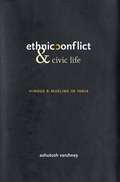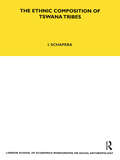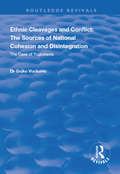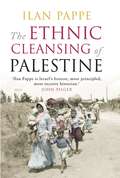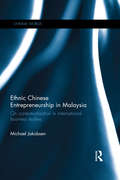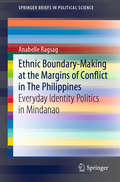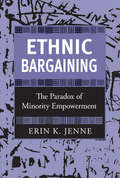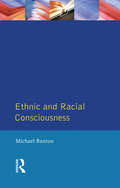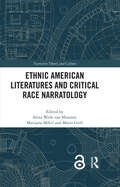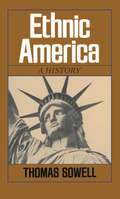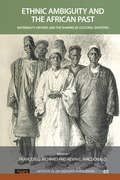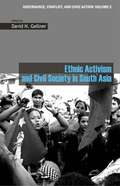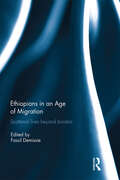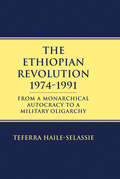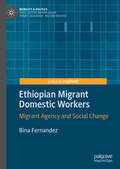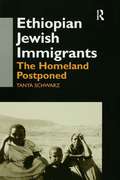- Table View
- List View
Ethnic Conflict In World Politics
by Barbara Harff Ted Robert GurrThis second edition of Ethnic Conflict in World Politics is an introduction to a new era in which civil society, states, and international actors attempt to channel ethnic challenges to world order and security into conventional politics. From Africa's post-colonial rebellions in the 1960s and 1970s to anti-immigrant violence in the 1990s the authors survey the historical, geographic, and cultural diversity of ethnopolitical conflict. Using an analytical model to elucidate four well-chosen case studies-the Kurds, the Miskitos, the Chinese in Malaysia, and the Turks in Germany-the authors give students tools for analyzing emerging conflicts based on the demands of nationalists, indigenous peoples, and immigrant minorities throughout the world. The international community has begun to respond more quickly and constructively to these conflicts than it did to civil wars in divided Yugoslavia and genocide in Rwanda by using the emerging doctrines of proactive peacemaking and peace enforcement that are detailed in this book. Concludes by identifying five principles of international doctrine for managing conflict in ethnically diverse societies. The text is illustrated with maps, tables, and figures.
Ethnic Conflict In World Politics
by Barbara Harff Ted Robert GurrThis second edition of Ethnic Conflict in World Politics is an introduction to a new era in which civil society, states, and international actors attempt to channel ethnic challenges to world order and security into conventional politics. From Africa's post-colonial rebellions in the 1960s and 1970s to anti-immigrant violence in the 1990s the authors survey the historical, geographic, and cultural diversity of ethnopolitical conflict. Using an analytical model to elucidate four well-chosen case studies-the Kurds, the Miskitos, the Chinese in Malaysia, and the Turks in Germany-the authors give students tools for analyzing emerging conflicts based on the demands of nationalists, indigenous peoples, and immigrant minorities throughout the world. The international community has begun to respond more quickly and constructively to these conflicts than it did to civil wars in divided Yugoslavia and genocide in Rwanda by using the emerging doctrines of proactive peacemaking and peace enforcement that are detailed in this book. Concludes by identifying five principles of international doctrine for managing conflict in ethnically diverse societies. The text is illustrated with maps, tables, and figures.
Ethnic Conflict in the Post-Soviet World: Case Studies and Analysis
by Leokadia Drobizheva Rose Gottemoeller Catherine McArdle Kelleher Lee WalkerPresents 16 case studies of ethnic conflict in the post-Soviet world. The book places ethnic conflict in the context of imperial collapse, democratization and state building.
Ethnic Conflict In Buddhist Societies: Sri Lanka, Thailand, Burma
by Kinglsey M. De SilvaThis volume contains a selection of the papers presented at a South and South-east Asia regional workshop on 'Minorities in Buddhist Polities: Sri Lanka, Thailand and Burma', organised by the International Centre for Ethnic Studies (ICES), Sri Lanka, and the Thai Studies Programme of Chulalongkorn University, Thailand. The tenor for 'Minorities
Ethnic Conflict and Protest in Tibet and Xinjiang: Unrest in China's West
by Ben Hillman Gray TuttleDespite a decade of rapid economic development, rising living standards, and large-scale improvements in infrastructure and services, China's western borderlands have experienced a wave of ethnic unrest not seen since the 1950s. Through on-the-ground interviews and first-hand observations, the international experts in this volume create an invaluable record of the conflicts and protests as they have unfolded-the most extensive chronicle of events to date. The authors examine the factors driving the unrest in Tibet and Xinjiang and the political strategies used to suppress them. They also explain why certain areas have seen a higher concentration of ethnic-based violence than others. For anyone struggling to understand the origins of unrest in contemporary Tibet and Xinjiang, this anthology is essential reading.
Ethnic Conflict and Protest in Tibet and Xinjiang: Unrest in China's West (Studies of the Weatherhead East Asian Institute, Columbia University)
by Ben Hillman Gray TuttleDespite more than a decade of rapid economic development, rising living standards, and large-scale improvements in infrastructure and services, China's western borderlands are awash in a wave of ethnic unrest not seen since the 1950s. Through on-the-ground interviews and firsthand observations, the international experts in this volume create an invaluable record of the conflicts and protests as they have unfolded—the most extensive chronicle of events to date. The authors examine the factors driving the unrest in Tibet and Xinjiang and the political strategies used to suppress them. They also explain why certain areas have seen higher concentrations of ethnic-based violence than others.Essential reading for anyone struggling to understand the origins of unrest in contemporary Tibet and Xinjiang, this volume considers the role of propaganda and education as generators and sources of conflict. It links interethnic strife to economic growth and connects environmental degradation to increased instability. It captures the subtle difference between violence in urban Xinjiang and conflict in rural Tibet, with detailed portraits of everyday individuals caught among the pressures of politics, history, personal interest, and global movements with local resonance.
Ethnic Conflict and International Intervention: Crisis in Bosnia-Herzegovina, 1990-93
by Steven L. Burg Paul S. ShoupThis book examines the historical, cultural and political dimensions of the crisis in Bosnia and the international efforts to resolve it. It provides a detailed analysis of international proposals to end the fighting, from the Vance-Owen plan to the Dayton Accord, with special attention to the national and international politics that shaped them. It analyzes the motivations and actions of the warring parties, neighbouring states and international actors including the United States, the United Nations, the European powers, and others involved in the war and the diplomacy surrounding it. With guides to sources and documentation, abundant tabular data and over 30 maps, this should be a definitive volume on the most vexing conflict of the post-Soviet period.
Ethnic Conflict and Civic Life: Hindus and Muslims in India
by Ashutosh VarshneyThis timely book, updated for the paperback edition, examines how civic ties between Hindus and Muslims in different Indian cities serve to contain, or even prevent, ethnic violence. It is of interest not only to South Asian scholars and policymakers but also to those studying multiethnic societies in other areas of the world.
The Ethnic Composition of Tswana Tribes
by Isaac SchaperaFirst published in 1953 and this edition in 1991, this book was created in association with the International African Institute. Since its first publication, anthropology and African Studies have changed a great deal, but the bedrock of both remains unchanged: solid, sensitive ethnographic and historical accounts of the peoples and cultures of the continent.
Ethnic Cleavages and Conflict: The Sources of National Cohesion and Disintegration - The Case of Yugoslavia (Routledge Revivals)
by Gojko VuckovicFirst published in 1997, this volume explores ethnic conflict alongside the creation and disintegration of the short-lived Yugoslav state, 17 years after the death of Tito. Processes of democratization tend to elicit differences within the population along deep-seated ethnic, religious and cultural differences. Dr. Gojko Vuekovic argues that the situation is no different in post-Cold War Yugoslavia. By setting out Yugoslavia’s worst-case scenario of ethnic tensions, Dr. Vuekovic hopes to inform responses to ethnic conflict in the wider modern world.
The Ethnic Cleansing of Palestine
by Ilan PappéThe 1948 Israeli War of Independence involved one of the largest forced migrations in modern history. Around a million people were expelled from their homes at gunpoint, civilians were massacred, and hundreds of Palestinian villages destroyed. Denied for almost six decades, had it happened today it could only have been called "ethnic cleansing".
Ethnic Church Meets Megachurch: Indian American Christianity in Motion (Sexual Cultures)
by Prema A KurienWinner, 2018 Section on Asia and Asian America Book Award presented by the American Sociological Association Traces the religious adaptation of members of an important Indian Christian church– the Mar Thoma denomination – as they make their way in the United States. This book exposes how a new paradigm of ethnicity and religion, and the megachurch phenomenon, is shaping contemporary immigrant religious institutions, specifically Indian American Christianity. Kurien draws on multi-site research in the US and India to provide a global perspective on religion by demonstrating the variety of ways that transnational processes affect religious organizations and the lives of members, both in the place of destination and of origin. The widespread prevalence of megachurches and the dominance of American evangelicalism created an environment in which the traditional practices of the ancient South Indian Mar Thoma denomination seemed alien to its American-born generation. Many of the young adults left to attend evangelical megachurches. Kurien examines the pressures church members face to incorporate contemporary American evangelical worship styles into their practice, including an emphasis on an individualistic faith, and praise and worship services, often at the expense of maintaining the ethnic character and support system of their religious community. Kurien’s sophisticated analysis also demonstrates how the forces of globalization, from the period of colonialism to contemporary out-migration, have brought about tremendous changes among Christian communities in the Global South. Wide in scope, this book is a must read for an audience interested in the study of global religions and cultures.
Ethnic Chinese Entrepreneurship in Malaysia: On Contextualisation in International Business Studies (Chinese Worlds)
by Michael JakobsenThe study of ethnic Chinese in Southeast Asia has a long tradition. What is most striking in these studies is just how difficult it is to generalise about this ethnic group in the region. Whether or not they have been able to identify as Chinese has to a certain extend depended on different processes of social and political engineering, which in turn make them more or less distinct as an ethnic group. In the case of Malaysia, national political schemes such as the affirmative action policy indirectly force the Malaysian ethnic Chinese to conceive of themselves as a coherent collective, and yet, when asked Chinese entrepreneurs in the maintain that despite the affirmative action policy ethnicity is not the a defining deciding factor when it comes to identifying business partners. This book focuses on the consequences of these kinds of policies in the field of inter-ethnic business practices and entrepreneurship in Malaysia within the wider context of the relationship between local, national and global markets. It focuses on the complexities of inter-ethnic relations and in particular, the strong economic position of the ethnic Chinese and their impact on the Malaysian economic scene as well as on the wider Southeast Asian region, underlining the degree to which inter-ethnic relations in Southeast Asia are crucial to understanding the political and economic complexitiescharacteristic of characterizing the region. In turn, it takes small and medium-sized enterprises as case studies, and shows how they are being shaped and in return shape the society in which they constitute a part. In doing so, the book highlights how these companies not only relate to the domestic economy, but also cater to the global economy, and presents a compelling argument for the introduction of a glocalised perspective in international business studies. Ethnic Chinese Entrepreneurship in Malaysia will be welcomed by students and scholars with an interest in Asian studies, political economy, international business studies, inter-ethnic relations and diaspora studies.
Ethnic Boundary-Making at the Margins of Conflict in The Philippines: Everyday Identity Politics in Mindanao (SpringerBriefs in Political Science)
by Anabelle RagsagThis book makes a significant interdisciplinary contribution to existing scholarship on ethnicity, conflict, nation-making, colonial history and religious minorities in the Philippines, which has been confronted with innumerable issues relating to their ethnic and religious minority populations. Using Sarangani Bay as a research site, the book zones in on the lives of the Muslim Sinamas and the Christianized indigenous B'laans as they navigate the effects of the ongoing turmoil in the Bangsamoro region in Muslim Mindanao—a multi-faceted conflict involving numerous armed groups, as well as clans, criminal gangs and political elites. This work considers the factors affecting the Muslim Moro people, who have long been struggling for their right to self-determination. The conflict in the Moro areas has evolved over the past five decades from an ethnonationalist struggle between an aggrieved minority and a thorny issue for the central government: a highly fragmented conflict with multiple overlapping causes of violence. The book provides a framework for understanding the ethnic separatism in the case of the southern part of the country, framed by the concept of ethnic boundaries. Providing an excellent blend of theory and empirical evidence, the author confronts how ethno-religious divisions adversely impact the quality of life and unpacks how these divisions challenge multiculturalist policies. Weaving together multiple branches of the social sciences, this book is of interest to policymakers, researchers and students interested in international relations and political science, Asian studies, ethnic studies, Philippines’ history, sociology and anthropology.
Ethnic Bargaining: The Paradox of Minority Empowerment
by Erin K. JenneIn Ethnic Bargaining, Erin K. Jenne introduces a theory of minority politics that blends comparative analysis and field research in the postcommunist countries of East Central Europe with insights from rational choice. Jenne finds that claims by ethnic minorities have become more frequent since 1945 even though nation-states have been on the whole more responsive to groups than in earlier periods. Minorities that perceive an increase in their bargaining power will tend to radicalize their demands, she argues, from affirmative action to regional autonomy to secession, in an effort to attract ever greater concessions from the central government.The language of self-determination and minority rights originally adopted by the Great Powers to redraw boundaries after World War I was later used to facilitate the process of decolonization. Jenne believes that in the 1960s various ethnic minorities began to use the same discourse to pressure national governments into transfer payments and power-sharing arrangements. Violence against minorities was actually in some cases fueled by this politicization of ethnic difference.Jenne uses a rationalist theory of bargaining to examine the dynamics of ethnic cleavage in the cases of the Sudeten Germans in interwar Czechoslovakia; Slovaks and Moravians in postcommunist Czechoslovakia; the Hungarians in Romania, Slovakia, and Vojvodina; and the Albanians in Kosovo. Throughout Ethnic Bargaining, she challenges the conventional wisdom that partisan intervention is an effective mechanism for protecting minorities and preventing or resolving internal conflict.
Ethnic and Racial Consciousness
by Michael BantonEthnic and Racial Consciousness is a completely revised version of the highly acclaimed first edition published in 1988. At that time no one expected the former Yugoslavia would break up with the brutal slaughter of neighbour by neighbour. Few would have predicted the horrific massacres in Rwanda and Burundi which have led to accusations of genocide. The ending of the cold war has been followed by struggles in the former Soviet Union in which one group has struggled for dominance and the other for independence. Ethnic conflict is now one of the main threats to peace in the contemporary world. This new edition offers an up-to-date introduction to the many issues surrounding our definition and understanding of ethnic and racial difference, racism and discrimination in general.
Ethnic Americans: A History of Immigration
by Leonard DinnersteinFor more than three decades, Ethnic Americans has been hailed as a classic history of immigration to America. Leonard Dinnerstein and David M. Reimers begin with a brief overview of immigration during the colonial and early national eras (1492 to the 1820s), focusing primarily on the arrival of English Protestants, while at the same time stressing the diversity brought by Dutch, French, Spanish, and other small groups, including "free people of color" from the Caribbean. Next they follow large-scale European immigration from 1830 to the 1880s. Catholicism became a major force in America during this period, with immigrants-five million in the 1880s alone-creating a new mosaic in every state of the Union. This section also touches on the arrival, beginning in 1848, of Chinese immigrants and other groups who hoped to find gold and get rich. Subsequent chapters address eastern and southern European immigration from 1890 to 1940; newcomers from the Western Hemisphere and Asia who arrived from 1840 to 1940; immigration restriction from 1875 to World War II; and the postwar arrival and experiences of Asian, Mexican, Hungarian, and Cuban refugees. Taking the past fifteen years into account, the fifth edition of Ethnic Americans considers recent influxes of Asians and Hispanics, especially the surge in the Mexican population, and includes expanded coverage of nativist sentiment in American politics and thought.
Ethnic American Literatures and Critical Race Narratology (Narrative Theory and Culture)
by von Mossner, Alexa WeikEthnic American Literatures and Critical Race Narratology explores the relationship between narrative, race, and ethnicity in the United States. Situated at the intersection of post-classical narratology and context-oriented approaches in race, ethnic, and cultural studies, the contributions to this edited volume interrogate the complex and varied ways in which ethnic American authors use narrative form to engage readers in issues related to race and ethnicity, along with other important identity markers such as class, religion, gender, and sexuality. Importantly, the book also explores how paying attention to the formal features of ethnic American literatures changes our under-standing of narrative theory and how narrative theories can help us to think about author functions and race. The international and diverse group of contributors includes top scholars in narrative theory and in race and ethnic studies, and the texts they analyze concern a wide variety of topics, from the representation of time and space to the narration of trauma and other deeply emotional memories to the importance of literary paratexts, genre structures, and author functions.
Ethnic America: A History
by Thomas SowellThis classic work by the distinguished economist traces the history of nine American ethnic groups--the Irish, Germans, Jews, Italians, Chinese, African-Americans, Puerto Ricans, and Mexicans.
Ethnic Ambiguity and the African Past: Materiality, History, and the Shaping of Cultural Identities (UCL Institute of Archaeology Publications #65)
by Francois G Richard Kevin C MacDonaldThe collective inquiries in this volume address ethnicity in ancient Africa as social fact and political artifact along numerous dimensions. Is ethnicity a useful analytic? What can archaeology say about the kinds of deeper time questions which scholars have asked of identities in Africa? Eleven authors engage with contemporary anthropological, historical and archaeological perspectives to examine how ideas of self-understanding, belonging, and difference in Africa were made and unmade. They examine how these intersect with other salient domains of social experience: states, landscapes, discourses, memory, technology, politics, and power. The various chapters cover broad geographic and temporal ground, following an arc across Senegal, Mali, Nigeria, Cameroon, the Democratic Republic of Congo, Rwanda, and East Africa, spanning from prehistory to the colonial period.
Ethnic Activism and Civil Society in South Asia (Governance, Conflict and Civic Action)
by David N. GellnerThis volume, the second in the Governance, Conflict, and Civic Action series, examines civil society in South Asia through case studies of different kinds of ethnic (′communal′) activism. With chapters covering Nepal, Sri Lanka, and India (Darjeeling, Rajasthan, Chhattisgarh, and Tamil Nadu), it avoids the ′methodological nationalism′ so frequent in social science publications on the region. The articles examine Hindu nationalism, Dalit activism in India and Nepal, and the Janajati movement in Nepal, and show how they are animated by common ideals and themes, such as emphasis on the involvement of youth, the assertion of pride and masculinity, the desire to resist injustice and reassess previously stigmatized symbols, the importance of land and belonging, and so on. South Asian civil society is a site of constant struggle. This volume shows how ethnic activists wrestle with official classifications and the categories of daily, traditional practices and attempt to turn these to their advantage, often bringing about radical social, political, and intellectual change as a result. It also argues that ethnic movements need to be investigated by social scientists as a part of civil society, and it shows how this can be done. Ethnic Activism and Civil Society in South Asia will be an ideal reference for those interested in ethnicity, sociology, political science, anthropology, and South Asian studies.
Ethiopians in an Age of Migration: Scattered lives beyond borders
by Fassil DemissieThe migration of Ethiopians across international borders is a recent phenomenon because of the limited integration of the country and society to the global economy. Since it was never colonized – aside from the Italian occupation of 1936-1941 – Ethiopia’s economy and society were not directly impacted by the ebb and flow of the global economy, and thus never generated international migration. Beginning in the 1970s, due to factors such as famine, rural poverty, civil war, and political repression, an unprecedented number of Ethiopian migrants began to leave their country in search of better, more secure lives. Today, this diaspora constitutes a distinctive community dispersed across the world, but bound by a common feeling of collectiveness and a shared history of the homeland. The contributors to this volume draw their work from a wide variety of interdisciplinary fields and provide new critical insight on Ethiopian migrants and their diaspora communities. What has emerged from these scholarly works is the recognition that the Ethiopian diaspora – although separated by oceans and nations, by politics, ethnicity, class, gender and age – are carving out a social and material world born out of their particular circumstances both "here" and "there". This book was originally published as a special issue of African and Black Diaspora: An International Journal.
Ethiopian Revolution 1974-1991: From a Monarchical Autocracy to a Military Oligarchy
by Teferra Haile-SelassieFirst published in 1997. Ethiopia, the only country in Africa to survive the nineteenth-century European scramble for the continent, has a long, unique, and complex history. This stretches back over three million years to Lucy, or as the Ethiopians call her Dinkenesh, the earliest known ancestor of the human race, to the political turmoil of late twentieth-century Africa. Teferra Haile-Selassie writes partly as a historian, but also, and perhaps more importantly, as a sincere and sensitive observer, who lived through the later historical events which he describes, and indeed played a notable role in several of them.
Ethiopian Migrant Domestic Workers: Migrant Agency and Social Change (Mobility & Politics)
by Bina FernandezThis book tells the stories of the Ethiopian women who migrate to work as domestic workers in the Middle East. Drawing on qualitative research in Ethiopia, Lebanon and Kuwait, the author reveals how women’s aspirations to migrate are constituted within unequal gendered structures of opportunity in Ethiopia and asks us to consider how gender, race, class and nationality intersect in the construction of migrant subjectivities and agency. By analysing the impact of migration on social reproduction both in Ethiopia and the destination countries, the book offers fresh empirical and theoretical insights into the largest stream of women’s autonomous international migration from Africa.
Ethiopian Jewish Immigrants in Israel: The Homeland Postponed
by Tanya SchwarzThis is an ethnographic study of Ethiopian Jews, or Beta Israel, a few years after their migration from rural Ethiopia to urban Israel. For the Beta Israel, the most significant issue is not, as is commonly assumed, adaptation to modern society, but rather 'belonging' in their new homeland, and the loss of control they are experiencing over their lives and those of their children. Ethiopian Jewish immigrants resist those aspects of the dominant society which they dislike: they reject normative Jewish practices and uphold Beta Israel religious and cultural ones, ideologically counteract disparaging Israeli attitudes, develop strong ethnic bonds and engage in overt forms of resistance. The difficulties of the present are also overcome by creating a perfect past and an ideal future: in what the author calls 'the homeland postponed', all Jews will be united in a colour-blind world of material plenty and purity.
